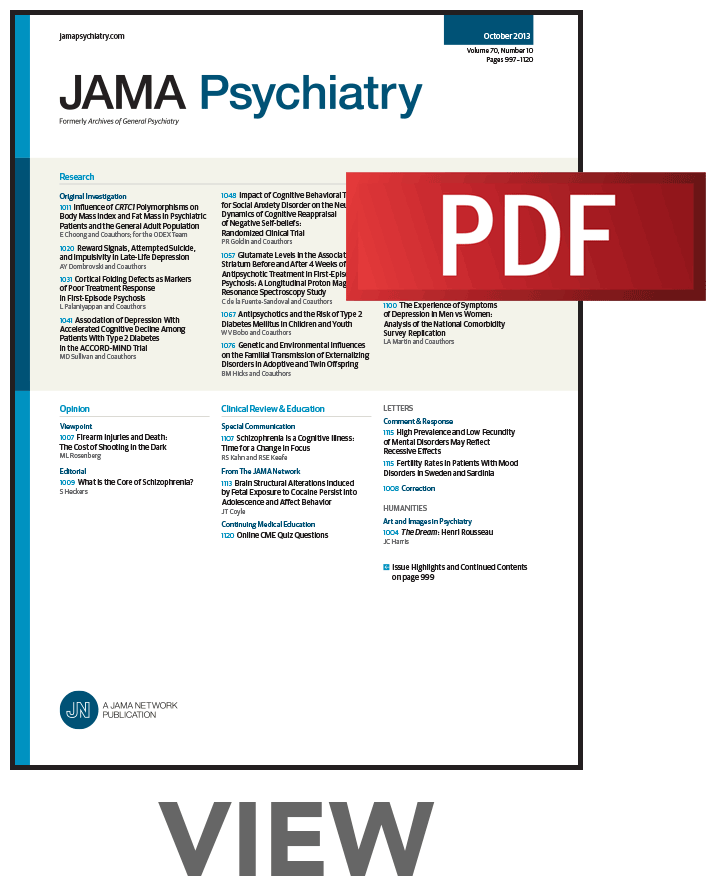Cannabis Use Among Individuals With Psychosis After State-Level Commercial Cannabis Legalization
IF 17.1
1区 医学
Q1 PSYCHIATRY
引用次数: 0
Abstract
ImportanceMany individuals can use cannabis without harm, but individuals with psychosis are particularly vulnerable to negative effects from cannabis. No studies to date have investigated how recreational cannabis legalization (RCL) affects cannabis use in individuals with psychosis.ObjectiveTo assess impacts of RCL in cannabis use among individuals who have ever been diagnosed with a psychotic illness or episode in the US.Design, Setting, and ParticipantsThis study used data from 2014 to 2022 on state-level RCL with 5 years of follow-up from the Population Assessment of Tobacco and Health, a nationally representative longitudinal cohort study of 1856 adults aged 18 years and older in the US. The study sample consisted of individuals with a lifetime history of psychosis. Data were analyzed between January and June 2025.Main Outcomes and MeasuresPercentage point (pp) changes in 30-day use of cannabis after RCL compared with control states using difference-in-differences methods.ResultsThe study sample consisted of 1856 individuals, with a mean age of 36.6 years (SD, 14.8 years) contributing 7465 responses, and was 50.2% White, 58.2% female, and had a 30-day cannabis-use rate of 31.8%. Individuals with psychosis in RCL states significantly increased their 30-day cannabis use by 9.53 pp (95% CI, 3.05-16.00 pp;国家级商业大麻合法化后精神病患者的大麻使用情况
许多人可以使用大麻而不会受到伤害,但精神病患者特别容易受到大麻的负面影响。迄今为止还没有研究调查娱乐性大麻合法化(RCL)如何影响精神病患者的大麻使用。目的评估在美国曾被诊断为精神病或发作的个体中,RCL对大麻使用的影响。设计、环境和参与者本研究使用了2014年至2022年的国家级RCL数据,并对烟草与健康人口评估进行了5年的随访,这是一项具有全国代表性的纵向队列研究,研究对象为美国1856名18岁及以上的成年人。研究样本包括有终生精神病病史的个体。研究人员分析了2025年1月至6月的数据。主要结果和测量方法采用差异中差异方法与对照状态比较,RCL后30天大麻使用百分比(pp)的变化。结果样本共1856人,平均年龄36.6岁(SD 14.8岁),共有7465人回复,其中白人50.2%,女性58.2%,30天大麻使用率为31.8%。RCL州精神病患者的30天大麻使用量显著增加了9.53 pp (95% CI, 3.05-16.00 pp; P = 0.004),敏感性分析显示零售店开业后有显著的估计,但之前没有,使用频率没有变化。结论和相关性在这项研究中,精神病患者报告说,在大麻在其所在州合法化和商业化后,目前大麻的使用量大幅增加,而且比以前报道的一般人群的估计量要大。鉴于大麻对精神病患者病程和卫生服务利用的负面影响,监管机构在制定税收、效力、广告和健康警告等政策时应考虑这些结果。
本文章由计算机程序翻译,如有差异,请以英文原文为准。
求助全文
约1分钟内获得全文
求助全文
来源期刊

JAMA Psychiatry
PSYCHIATRY-
CiteScore
30.60
自引率
1.90%
发文量
233
期刊介绍:
JAMA Psychiatry is a global, peer-reviewed journal catering to clinicians, scholars, and research scientists in psychiatry, mental health, behavioral science, and related fields. The Archives of Neurology & Psychiatry originated in 1919, splitting into two journals in 1959: Archives of Neurology and Archives of General Psychiatry. In 2013, these evolved into JAMA Neurology and JAMA Psychiatry, respectively. JAMA Psychiatry is affiliated with the JAMA Network, a group of peer-reviewed medical and specialty publications.
 求助内容:
求助内容: 应助结果提醒方式:
应助结果提醒方式:


